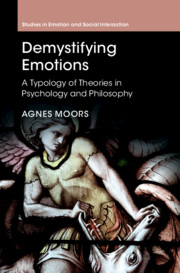Book contents
- Demystifying Emotions
- Studies in Emotion and Social Interaction
- Demystifying Emotions
- Copyright page
- Contents
- Figures
- Tables
- Boxes
- Preface
- Acknowledgment
- Abbreviations
- Part I Introduction
- Part II Emotion Theories One by One
- Chapter 3 General Precursors
- Chapter 4 Evolutionary Theories
- Chapter 5 Network Theories
- Chapter 6 Stimulus Evaluation Theories
- Chapter 7 Response Evaluation Theories
- Chapter 8 Psychological Constructionist Theories
- Chapter 9 Social Theories
- Part III Conclusion
- References
- Index
- Titles Published in the Second Series (continued from page ii)
Chapter 7 - Response Evaluation Theories
from Part II - Emotion Theories One by One
Published online by Cambridge University Press: 11 August 2022
- Demystifying Emotions
- Studies in Emotion and Social Interaction
- Demystifying Emotions
- Copyright page
- Contents
- Figures
- Tables
- Boxes
- Preface
- Acknowledgment
- Abbreviations
- Part I Introduction
- Part II Emotion Theories One by One
- Chapter 3 General Precursors
- Chapter 4 Evolutionary Theories
- Chapter 5 Network Theories
- Chapter 6 Stimulus Evaluation Theories
- Chapter 7 Response Evaluation Theories
- Chapter 8 Psychological Constructionist Theories
- Chapter 9 Social Theories
- Part III Conclusion
- References
- Index
- Titles Published in the Second Series (continued from page ii)
Summary
This chapter discusses response evaluation theories (RETs), which foreground a process of response evaluation. It zooms in on the goal-directed theory of Moors (2017a), which proposes a goal-directed cycle as the causal-mechanistic explanation of the phenomena called emotions. The cycle starts with the detection of a discrepancy between a stimulus and a first goal, which activates a second goal to reduce the discrepancy. This reduction can take the form of assimilation (of the stimulus to the goal via overt action), accommodation (of the goal to the stimulus by changing the first goal), and/or immunization (reinterpretion of the stimulus as less discrepant). Assimilation requires further selection of the action with the highest expected utility. This in turn activates a third goal to engage in the action, leading to overt somatic and motor responses and feelings. The goal-directed theory can account for continuity, a rich form of Intentionality, phenomenality, bodily aspects, heat, control precedence, and irrationality. This wide scope is combined with parsimony in that presumed emotions and non-emotional phenomena are explained by the same mechanism. The goal-directed theory does not deliver discrete emotions, but can nevertheless make sense of them. Empirical research that tests the goal-directed theory is discussed.
Keywords
- Type
- Chapter
- Information
- Demystifying EmotionsA Typology of Theories in Psychology and Philosophy, pp. 209 - 244Publisher: Cambridge University PressPrint publication year: 2022

